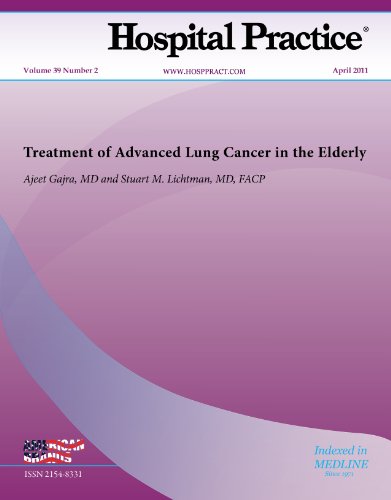Treatment of Advanced Lung Cancer in the Elderly (DOI: 10.3810/hp.2011.04.400) (Hospital Practice)
CHEAP,Discount,Buy,Sale,Bestsellers,Good,For,REVIEW, Treatment of Advanced Lung Cancer in the Elderly (DOI: 10.3810/hp.2011.04.400) (Hospital Practice),Wholesale,Promotions,Shopping,Shipping,Treatment of Advanced Lung Cancer in the Elderly (DOI: 10.3810/hp.2011.04.400) (Hospital Practice),BestSelling,Off,Savings,Gifts,Cool,Hot,Top,Sellers,Overview,Specifications,Feature,on sale,Treatment of Advanced Lung Cancer in the Elderly (DOI: 10.3810/hp.2011.04.400) (Hospital Practice) Treatment of Advanced Lung Cancer in the Elderly (DOI: 10.3810/hp.2011.04.400) (Hospital Practice)

Treatment of Advanced Lung Cancer in the Elderly (DOI: 10.3810/hp.2011.04.400) (Hospital Practice) Overview
Lung cancer remains the leading cause of cancer-related mortality in the United States. Almost half of all lung cancer occurs at age > 70 years. The majority of patients with lung cancer present with locally advanced or metastatic disease. Management of advanced lung cancer in the older patient is a commonly encountered clinical scenario. There is a paucity of clinical data guiding the management of lung cancer in the elderly due to underrepresentation of the elderly in clinical trials. The elderly have unique alterations in physiology that put them at a greater risk of toxicity from chemotherapy and biologic therapy. Comorbid conditions, common among the elderly, can further reduce tolerance to therapy. As a consequence, older patients have worse outcomes than younger patients. It is important to look beyond chronologic age to better risk stratify patients when making treatment decisions in older patients with lung cancer. The basic principles of management, especially in the fit elderly, do not differ from those in younger patients. This article provides an overview of management of advanced non-small cell lung cancer. The magnitude of the problem and current treatment guidelines for lung cancer are reviewed with a focus on barriers specific to the elderly. The available clinical trials that have specifically studied the elderly with lung cancer are summarized. The evolving role of palliative care is discussed, as well as the need for integrating geriatric assessment in the care of elderly patients with lung cancer.
Treatment of Advanced Lung Cancer in the Elderly (DOI: 10.3810/hp.2011.04.400) (Hospital Practice) Specifications
Lung cancer remains the leading cause of cancer-related mortality in the United States. Almost half of all lung cancer occurs at age > 70 years. The majority of patients with lung cancer present with locally advanced or metastatic disease. Management of advanced lung cancer in the older patient is a commonly encountered clinical scenario. There is a paucity of clinical data guiding the management of lung cancer in the elderly due to underrepresentation of the elderly in clinical trials. The elderly have unique alterations in physiology that put them at a greater risk of toxicity from chemotherapy and biologic therapy. Comorbid conditions, common among the elderly, can further reduce tolerance to therapy. As a consequence, older patients have worse outcomes than younger patients. It is important to look beyond chronologic age to better risk stratify patients when making treatment decisions in older patients with lung cancer. The basic principles of management, especially in the fit elderly, do not differ from those in younger patients. This article provides an overview of management of advanced non-small cell lung cancer. The magnitude of the problem and current treatment guidelines for lung cancer are reviewed with a focus on barriers specific to the elderly. The available clinical trials that have specifically studied the elderly with lung cancer are summarized. The evolving role of palliative care is discussed, as well as the need for integrating geriatric assessment in the care of elderly patients with lung cancer.

